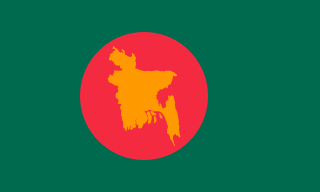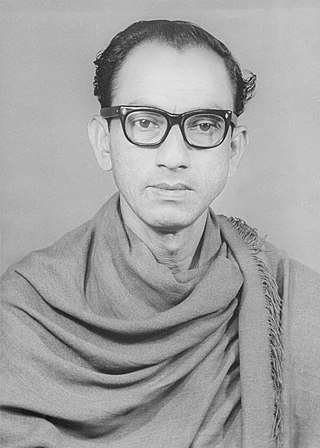
Sheikh Mujibur Rahman, popularly known by the honorific prefix Bangabandhu, was a Bangladeshi politician, revolutionary, statesman, activist and diarist. As a politician, Mujib had held continuous positions either as Bangladesh's president or as its prime minister from April 1971 until his assassination in August 1975. Mujib successfully led the Bangladeshi independence movement and restored Bengali sovereignty after over two centuries following the Battle of Plassey in 1757, for which he is honoured as the "Father of the Nation" in Bangladesh who declared independence. In the 2004 BBC opinion poll, Mujib was voted as the Greatest Bengali of all time.

The Bengali language movement was a political movement in former East Bengal in 1952, advocating the recognition of the Bengali language as a co-lingua franca of the then-Dominion of Pakistan to allow its use in government affairs, the continuation of its use as a medium of education, its use in media, currency and stamps, and to maintain its writing in the Bengali script.

Moudud Ahmed was a Bangladeshi lawyer and politician. He was a standing committee member of Bangladesh Nationalist Party. Ahmed was elected as a Jatiya Sangsad member total five times from Noakhali-1 and Noakhali-5 constituencies.

Maulana Azad College is a public institute of liberal arts, commerce and science in India, located in central Kolkata, West Bengal, India. The college is fully government-administered. It is located near the junction of Rafi Ahmed Kidwai Road and SN Banerjee Road, popularly called "Lotus crossing".

Sheikh Mujibur Rahman, the first president of Bangladesh, was assassinated along with most of his family members during the early hours of 15 August 1975 by a group of Bangladesh Army personnel who invaded his residence as part of a coup d'état. The Minister of Commerce, Khondaker Mostaq Ahmad, immediately took control and proclaimed himself head of an interim government from 15 August to 6 November 1975; he was in turn succeeded by Chief Justice Abu Sayem. The assassination marked the first direct military intervention in Bangladesh's civilian administration. Lawrence Lifschultz characterized this incident as an outcome of the Cold War between the United States-influenced Pakistan and the Soviet Union-influenced India. 15 August is annually observed as National Mourning Day, a commemorative day in Bangladesh.

The Independence and National Day is celebrated on 26 March as a national holiday in Bangladesh. It commemorates the country's declaration of independence from Pakistan in the early hours of March 26, 1971.

The independence of Bangladesh was declared on 26 March 1971, at the onset of the Bangladesh Liberation War by Bangabandhu Sheikh Mujibur Rahman; the following day the declaration was broadcast by Major Ziaur Rahman from Swadhin Bangla Betar Kendra radio station in Kalurghat, Chattogram. On 10 April, the Provisional Government of Bangladesh issued a proclamation on the basis of the previous declaration and established an interim constitution for the independence movement.

The 7th March Speech of Bangabandhu, or the 7/3 Speech, was a public speech given by Sheikh Mujibur Rahman, the Founding Father of Bangladesh on 7 March 1971 at the Ramna Race Course in Dhaka to a gathering of over one million (1,000,000) people. It was delivered during a period of escalating tensions between East Pakistan and the powerful political and military establishment of West Pakistan. In the speech, Bangabandhu informally declared the independence of Bangladesh, proclaiming: "The struggle this time, is a struggle for our liberty. The struggle this time, is a struggle for our independence." He announced a civil disobedience movement in the province, calling for "every house to turn into a fortress".

Gulistan is one of the busiest commercial areas in Dhaka, Bangladesh. A major transportation node, it originated around a now-demolished Pakistan-era cinema hall and is now a hub for commercial activity, particularly consumer goods. The area houses several important government establishments, including the Bangabandhu National Stadium. However, Gulistan suffers from issues such as overcrowding, traffic congestion, and criminal activity due to its dense population and commercial nature.

Awami League, officially All-Pakistan Awami League and All-Pakistan Awami Muslim League before 1955, was a Pakistani political party founded by Huseyn Shaheed Suhrawardy in February 1950. Pir of Manki Sharif and Khan Ghulam Mohammad Khan from the North-West Frontier Province (NWFP) joined it soon afterwards.

Sheikh Rehana Siddiq is a Bangladesh Awami League politician. She is the younger sister of the former Prime Minister Sheikh Hasina and the daughter of the first President of Bangladesh Sheikh Mujibur Rahman. She is also the mother of Tulip Siddiq, a British Labour Party politician and elected Member of Parliament and City Minister.
Noor-E-Alam Chowdhury is a Bangladesh Awami League politician and a former Jatiya Sangsad member representing the Madaripur-1 constituency and the former Chief whip of Jatiya Sangsad.

The military coup in Bangladesh on August 15 of 1975 was launched by mid-ranking army officers in order to assassinate founding president Sheikh Mujibur Rahman, whose administration post-independence grew corrupt and reportedly authoritarian until he established a one-party state-based government led by the socialist party Bangladesh Krishak Sramik Awami League. Mujib, along with his resident family members, were killed during the coup but was survived by his two then-expat daughters, one of them being future prime minister Sheikh Hasina. The officers were led by Capt. Abdul Majed, Maj. Syed Faruque Rahman, Maj. Khandaker Abdur Rashid and Maj. Shariful Haque Dalim.
The non-cooperation movement of 1971 was a historical movement in then East Pakistan by the Awami League and the general public against the military government of Pakistan in March of that year. After the announcement of the suspension of the session of the National Assembly of Pakistan on 1 March, the spontaneous movement of the people started, but officially on the call of Sheikh Mujibur Rahman, the non-cooperation movement started on 2 March and continued until 25 March. The movement lasted for a total of 25 days.

Sheikh Lutfur Rahman was a Bangladeshi serestadar, an officer responsible for record-keeping at the Gopalganj civil court in British India. His son Sheikh Mujibur Rahman was the first president of Bangladesh. Lutfar was also the paternal grandfather of Sheikh Hasina.

Mosharraf Hossain was a politician and lawyer from Jessore, Bangladesh. He was actively involved in the Bengali nationalist movement in East Pakistan and the Liberation War of Bangladesh in 1971.
Provincial elections were held in East Pakistan on 17 December 1970, ten days after general elections. A total of 1,850 candidates ran for the 300 seats in the East Pakistan Provincial Assembly. The result was a landslide victory for the Awami League, which won 288 of the 300 seats.

"Jodi Raat Pohale Shona Jeto" is a song from the 1991 Bangladeshi music album named Jonotar Nouka. The lyricist of this modern music was Hasan Motiur Rahman. Moloy Kumar Ganguly composed sang originally this song to the tune with music arrangement of Almas Ali. The song is considered to be the most popular song about Sheikh Mujibur Rahman. The song was released under label of Chenasur along with other songs from the audio album.
The Bangladesh Krishak Sramik Awami League was a political party established in 1983 by expelled members of the Bangladesh Awami League. Abdur Razzaq was the founder of this party. In the 2022 meeting of the Central Executive Parliament of Bangladesh Awami League, politicians admitted that after the creation of the BAKSAL, the party faced loss.

The Sayem ministry led what eventually became the first interim government in independent Bangladesh and an unofficial model for future interim regimes. It was formed on 8 November 1975, following the assassination of Brig. Gen. Khaled Mosharraf on 7 November amid a nationwide soldier and public uprising against his 3 November coup d'état. After a three-day coup with support of some high-ranking officers and his Dhaka Brigade, Mosharraf had forced Khondaker Mostaq Ahmad, who, following the 15 August coup that assassinated the autocratic founding president Sheikh Mujibur Rahman, replaced him as President of Bangladesh with support of the mid-ranking assassin officers, to resign. Chief Justice Sayem, with the constitutional requirement for the direct election of the president and role of the vice-president as acting president suspended by Mostaq under a martial law proclamation, had been installed in his place. With Mosharraf's death the responsibility of CMLA fell on Sayem.
















